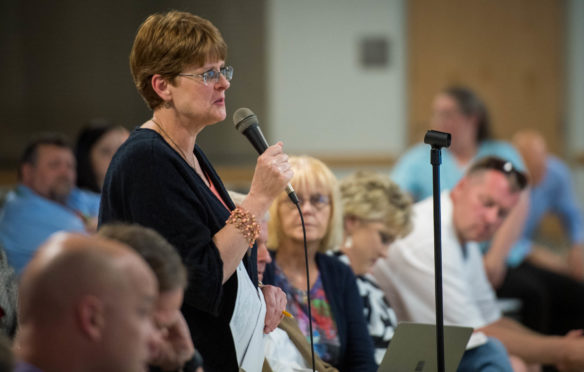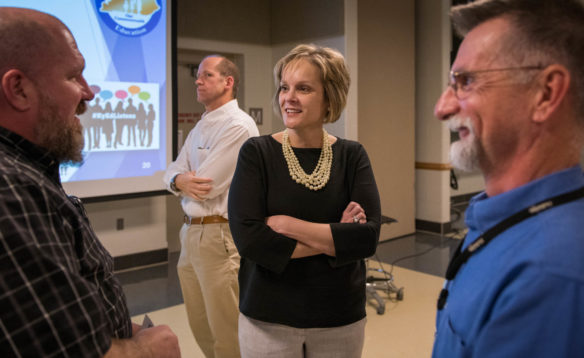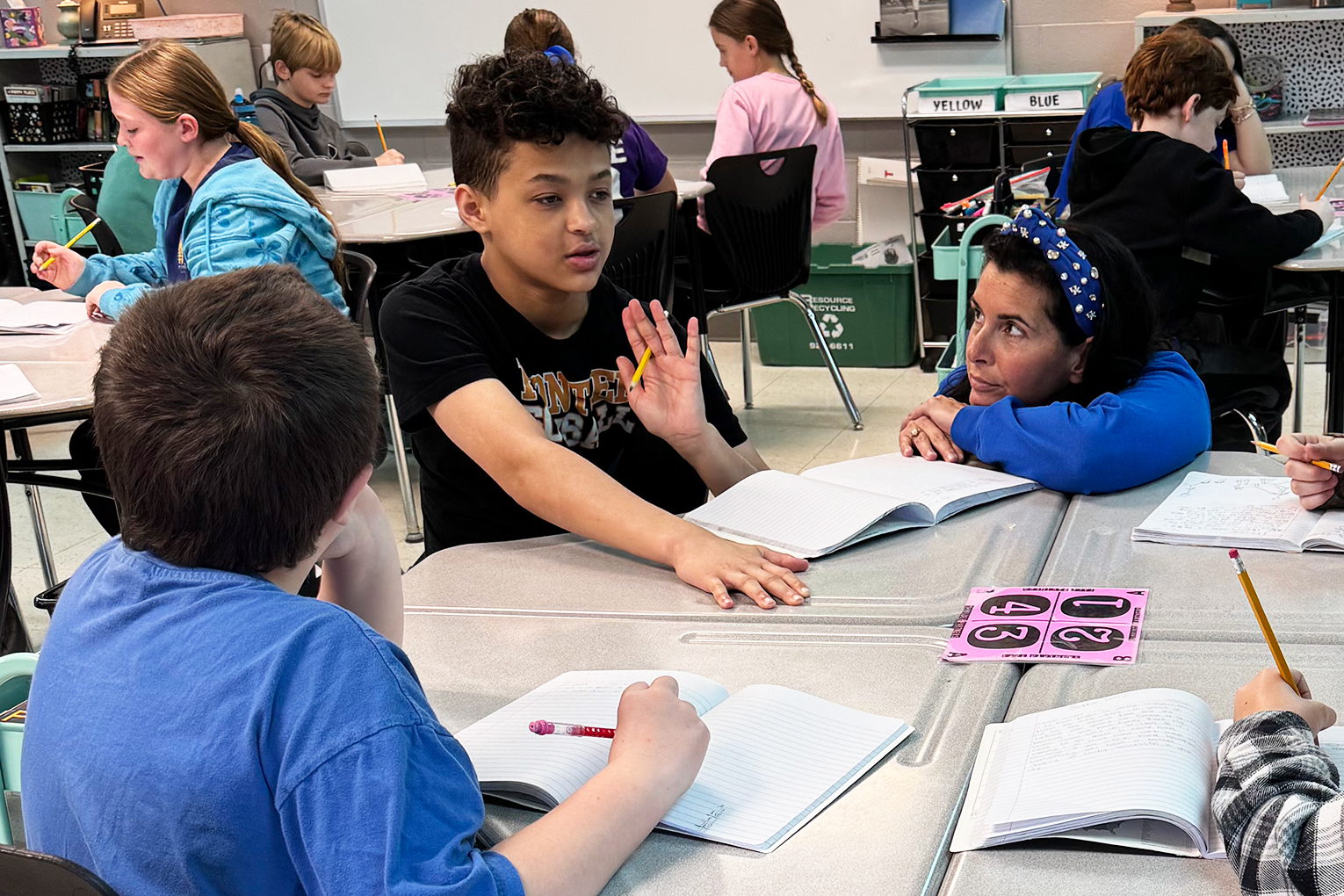
Jennifer Marsh, associate professor of Spanish at the University of the Cumberlands, addresses the Kentucky Department of Education staff during a town hall at the Laurel County Schools Center for Innovation in London.
Photo by Bobby Ellis, April 12, 2018
By Mike Marsee
mike.marsee@education.ky.gov
The world and its economy are changing rapidly, and Kentucky is preparing to make changes to the way in which it sends high school graduates into the workforce.
The work to revise graduation requirements for Kentucky high school students has begun on several fronts as the Kentucky Department of Education (KDE) gathers feedback from educators and other stakeholders about what high school graduates should be able to know and do to be ready for the next phase of their lives.
Kentucky’s minimum graduation requirements have not been altered since 2013, when an option for early graduation was added. Laura Arnold, an associate commissioner in KDE’s Office of Career and Technical Education, said now is the right time to re-evaluate them.
“When you look at the future of the workforce, we know that we have gaps, we know we have a pipeline shortage of talent, so we really want to start talking about what a student needs to be successful in a career,” Arnold said. “It’s not just thinking about what a student needs to graduate high school, but what they need to transition to that next piece.”
Interim Commissioner of Education Wayne Lewis has launched an accelerated process in which stakeholders can provide feedback at any time through an online survey that will expedite the development process. Lewis said he intends to present the Kentucky Board of Education (KBE) with a framework for consideration and feedback in June so schools will have time to implement the new requirements for students entering high school in fall 2019.
“It is still critical to get input from parents, educators and others,” Lewis said. “But we want to be more aggressive with the timeline for developing and implementing more rigorous, meaningful and flexible requirements for graduation. Kentucky’s students, colleges and the business community cannot wait another year.”
More than 1,500 people had taken the survey as of April 27. Those who participate in the survey are being asked to consider three questions:
- What experiences would you like for students to have during high school?
- What are the trends/issues that impact the current and future workforce?
- Based on Kentucky’s current graduation requirements, what would you change to best prepare students for the next step?
Those questions also were on the table in March when KDE brought together about 80 shareholders from business and industry and K-12 and postsecondary education to identify the knowledge and skills a Kentucky graduate should have as he or she leaves high school. They created the “Profile of a Kentucky High School Graduate,” which will be used as a guide for the development and revision of the state’s graduation requirements. KBE also began looking at graduation requirements at its most recent meeting.

Kentucky Department of Education Associate Commissioner Laura Arnold speaks with Sherman Cook, left, principal at Rockcastle County Area Technology Center, and Gerald Brinson, right, an automotive technology instructor at Pulaski County Area Technology Center. The three spoke following a town hall meeting on graduation requirements in London.
Photo by Bobby Ellis, April 12, 2018
The KDE development committees will finalize recommendations on revisions to graduation requirements to the KBE. Implementation of new requirements is tentatively planned to take effect for 9th-graders in the 2019-20 school year.
Work on revising those requirements is following work on Kentucky’s accountability system, which is being put in place for the 2018-19 school year to meet the requirements of the federal Every Student Succeeds Act (ESSA).
“As we finished our work with our ESSA plan, it was a good time to move into the graduation requirements conversation,” Arnold said.
Gerald Brinson, an automotive technology instructor at Pulaski County Area Technology Center, said what he is hearing from industry professionals who serve on his program’s advisory committee is similar to what he heard at the graduate profile meeting and elsewhere.
“The people in our industry, they’re basically our customers. They’re the people that are going to hire our students, so their input is very important on how we teach and what we teach,” Brinson said. “They’re wanting a lot more basic employability skills – critical thinking, financial literacy, communication skills, eye contact, how to fill out a form, how to interact personally – all those things that are important that we’re just not quite getting across.”
Brinson said academics shouldn’t be overlooked, but the academic requirements should be more closely aligned with the skills a student will need for his or her career.
“We all teach a certain degree of advanced math at area technology centers, but it’s math as it applies to that career area,” he said. “That’s where it really helps the student to see how it’s important and why it’s important.”
Deann Stivers Allen, an instructional supervisor in the Clay County schools, said another important part of preparing students for future success is getting teachers to work outside of traditional content areas to meet those students’ needs.
“We’ve got to prepare our teachers so that they can prepare lessons that meet the needs of our students in the 21st century,” she said. “We are very good at content, especially at the secondary level, but we often get so lost in our content that we’re not able to provide the students with the things we’ve talked about here.”
Robin McCoy, the comprehensive school counseling program coordinator at KDE, said how schools utilize their school counselors will become increasingly important as well.
“School counselors must be made available to advise students and facilitate programs that involve whole-school, whole-community and whole-child approaches to ensure high school graduation is not the end result, but is a guaranteed ticket to success for their desired career and life choices,” McCoy said. “School counselors are integral to providing and facilitating advising programs that allow the needs of each individual student to be known and appreciated and to drive the decision-making that takes place in a school.
“School counseling can no longer be about test coordination; it must be about meeting the needs of our students both developmentally and academically.”
MORE INFO …
Deann Stivers Allen deann.allen@clay.kyschools.us
Laura Arnold laura.arnold@education.ky.gov
Gerald Brinson gerald.brinson@pulaski.kyschools.us
Robin McCoy robin.mccoy@education.ky.gov




Leave A Comment